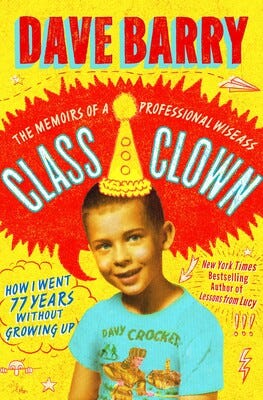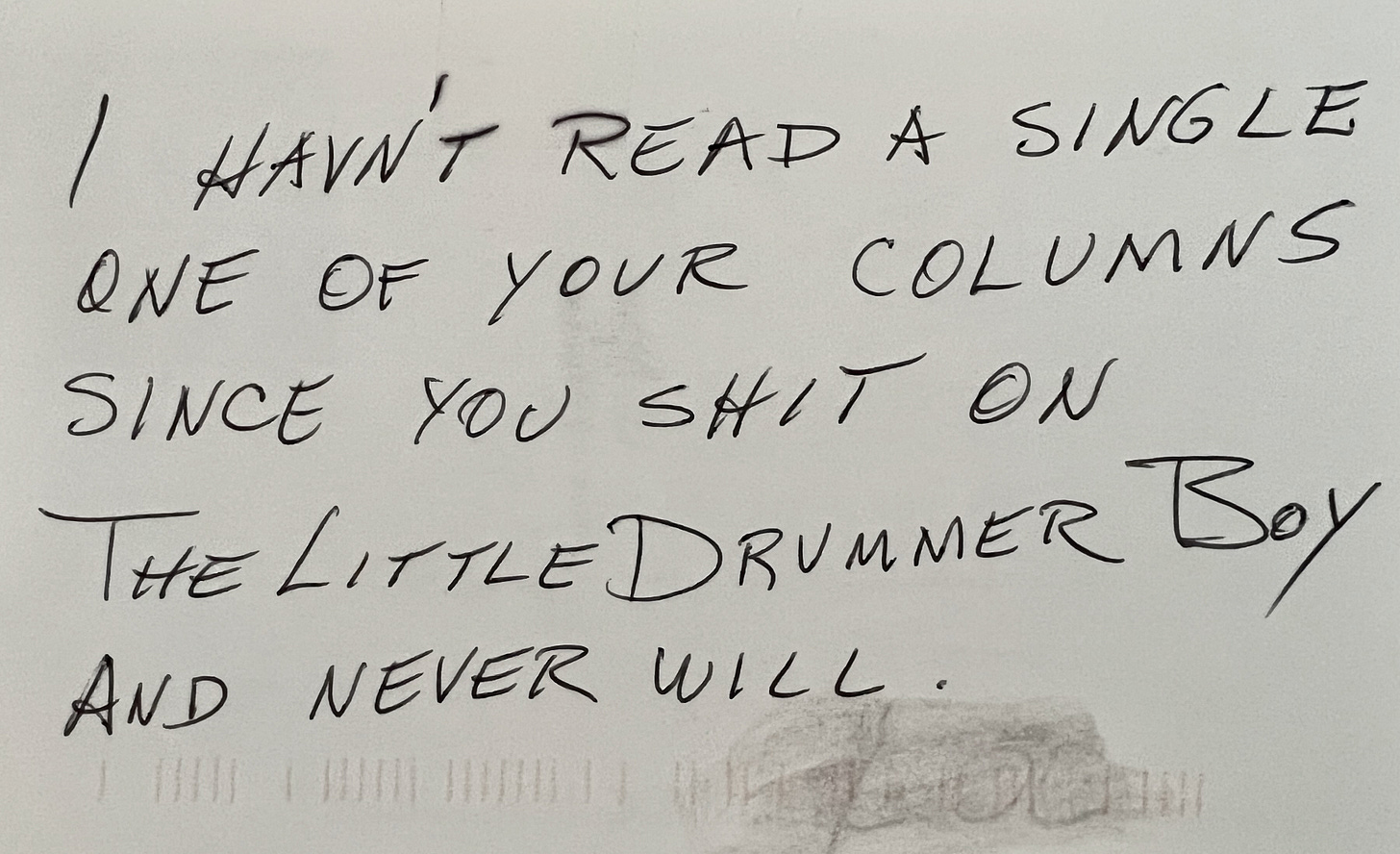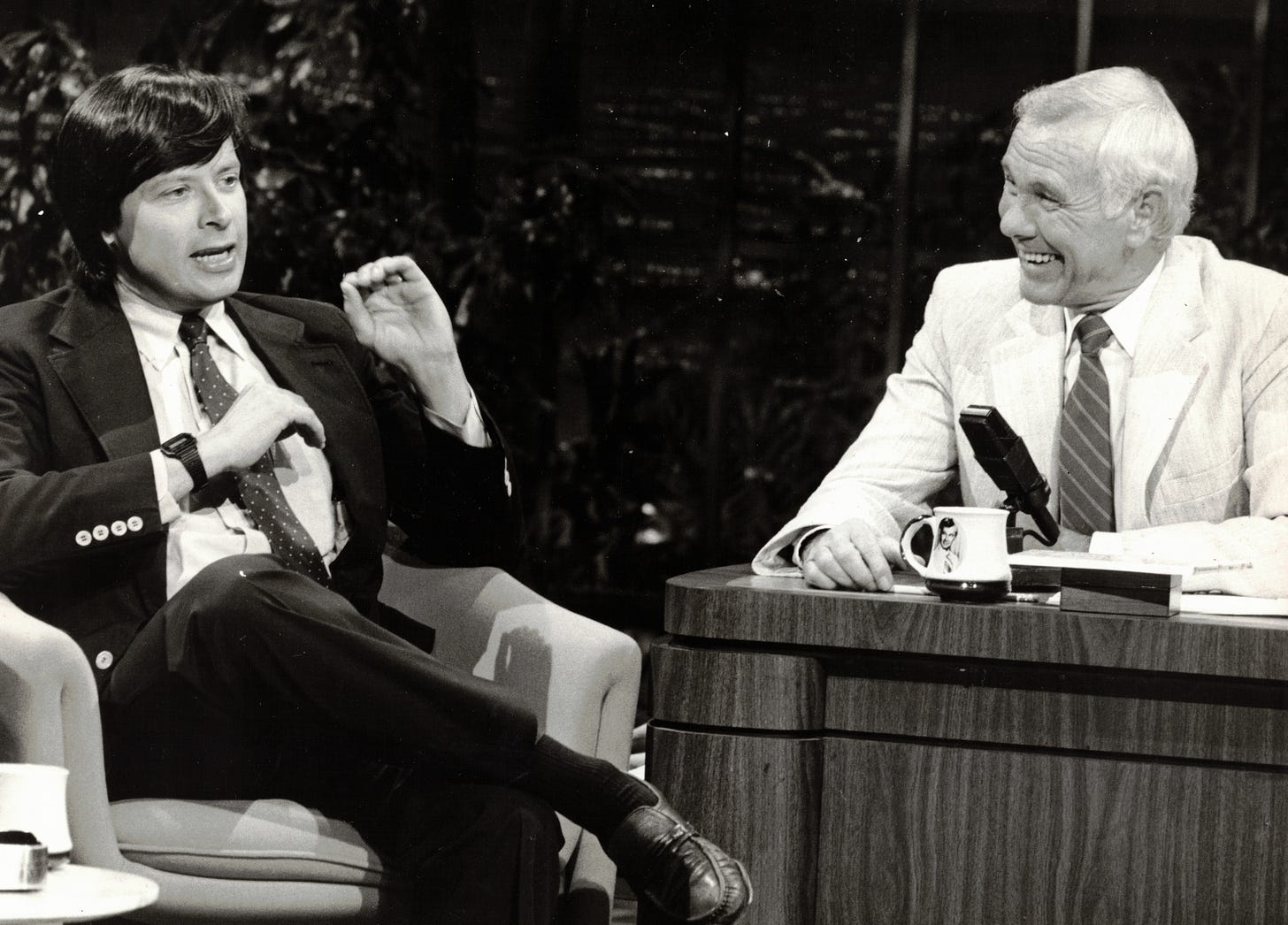So I wrote a memoir. The title is Class Clown, and the central literary theme is that, after a long and rewarding career in the field of humor, I am still not dead. Although that could change soon, to judge from the book tour I'm about to embark on.
Usually on a book tour, the order in which you go to cities is related, at least vaguely, to where the cities are physically located. This is not the case with my Class Clown tour, which was planned by the Random Cities Generator. Here's a map showing my itinerary (I am not making this itinerary up):
So I will be literally crisscrossing the nation. I may not be visiting every state, but I will be flying directly over, or at least close to, most of them, including Alaska, which according to this map is located right off the Arizona coast.
If you live in or near one of my book-tour cities, and you'd enjoy attending an intellectual, thought-provoking event that will make you a better person, I hope you find one. Otherwise please consider coming to one of my book events. You can register for them here. The dress code is: clothing.
If you can't make it to an event, but you'd like to get a signed and even personalized copy of Class Clown, you can order one from my local independent bookstore, Books and Books by clicking this link. Please order by May 9.
ABOUT MY BOOK
Class Clown tells the heartwarming story of how I went from being a small-time humor writer nobody ever heard of to a famous celebrity humor writer a lot of people still have never heard of. It is not entirely a humor book; there are some sad parts. But I hope you'll find it entertaining.
It starts with my childhood in Armonk, N.Y. Here's an excerpt from the chapter on my schoolboy days:
The Big News Thing that happened while I was in fifth grade was Sputnik (Russian for "little Sput"). That was the Earth’s first manmade satellite, which the Russians launched into orbit in October of 1957, and hoo boy, did it ever upset the grownups. Until Sputnik, we Americans just assumed we were technologically superior to the Russians. Why not? We had nicer cars! We had way more television sets! Some Americans even had color TV! Granted, the color rendering was terrible, so the people on TV all appeared to have fatal skin disorders. But still! The Russians didn’t even have color TV! So HOW COULD THEY SEND UP A WORKING SATELLITE BEFORE WE DID?
Yes, Sputnik was a major blow to America’s self-esteem. But we are not a nation of quitters. Just as Davy Crockett did not quit whacking Mexicans at the Alamo until he was dead, the United States of America did not quit the Space Race. On Dec. 6, 1957, less than two months after the Sputnik launch, a team of American scientists, engineers, military personnel and civilian officials gathered in Cape Canaveral to watch the launch of American’s first satellite. Here’s the Wikipedia account of what happened:
…the booster ignited and began to rise, but about two seconds after liftoff, after rising about 1.2 m (four feet), the rocket lost thrust and fell back to the launch pad. As it settled, the fuel tanks ruptured and exploded, destroying the rocket and severely damaging the launch pad. The Vanguard 1A satellite was thrown clear and landed on the ground a short distance away with its transmitters still sending out a beacon signal.
That’s right: While Sputnik was hundreds of miles overhead, hurtling along at 18,000 miles an hour, broadcasting cheerful futuristic beeps as it zipped all the way around the Earth once every 96 minutes, our rocket soared to approximately the height of a mailbox, then blew up. On the plus side, our satellite courageously continued transmitting a beacon signal, thereby making itself easy to locate as it lay there on the ground.
So all of a sudden the United States didn’t look so superior. And as I said, the grownups of 1957 were totally freaked out by this. Something had gone terribly wrong; somebody had completely dropped the ball. And our nation’s leaders felt it was time to put the blame where it belonged: On the fifth graders of Whippoorwill School.
At least that’s how it felt. Suddenly we students were hearing a LOT from our teachers — who were hearing it from the politicians — about how America’s young people needed to improve in math and science. Never mind the fact that it wasn’t our fault the Russians were winning the Space Race: WE were the ones who were going to receive additional math and science instruction; WE were the ones who would be given more homework; WE were the ones who would be expected to understand algebra and trigonometry, including something called the “cosine,” which none of us — I speak for my generation here — have ever really understood the purpose of. Did our nation’s leaders — the people who were actually in charge when we fell behind in the Space Race — did THEY get saddled with trying to understand the “cosine”? They did not. They dumped that impossible task onto the fifth graders of Whippoorwill School.
And as you can tell, we are still bitter.
A lot of Class Clown is about my readers, who were a big part of the syndicated newspaper column I wrote for a few decades. I had wonderful readers; they gave me many column ideas, and a lot of encouragement. But not all readers were fans of my work. Here, for example, is a postcard I received referring to a column I wrote about Christmas carols:
As I note in the book, even the readers who hated my column helped me write it. Here's an excerpt describing what happened when I was mildly critical of a beloved musical icon:
No column that I wrote on a musical topic generated anything like the level of reader hostility that was directed at me when I made the near-fatal mistake of criticizing Neil Diamond.
What happened was, I wrote a column about songs that, when they come on the radio, make me want to immediately change the station. One of them is “I Am, I Said,” in which Neil sings, with great intensity and emotion, these lyrics:
I am, I said
To no one there
And no one heard at all
Not even the chair.
Here’s what I said in my column:
Is Neil telling us he’s surprised that the chair didn’t hear him? Maybe he expected the chair to say, "Whoa, I heard THAT." My guess is that Neil was really desperate to come up with something to rhyme with 'there,' and he had already rejected "So I ate a pear," "Like Smokey the Bear," and "There were nits in my hair."
Please note that I was not attacking Neil Diamond’s entire oeuvre. I think he’s a very talented songwriter. I like many of his songs. I was merely pointing out that this one particular lyric is bad.
Well.
This criticism did NOT sit well with the large Neil Diamond fan community, which feels about Neil the way devout Christians feel about Jesus, only more passionately. I got many, many irate letters from these fans, making the following points:
1. You, Mr. Barry, are an idiot.
2. For your information Neil Diamond is a GENIUS.
3. He has written MANY brilliant songs.
4. “Cracklin’ Rosie” for example.
5. Also “Sweet Caroline.”
6. How many great songs have YOU written, Mr. Barry?
7. NONE, Because you have NO TALENT, which is why you are JEALOUS OF NEIL DIAMOND.
8. What about “Song Sung Blue?”
9. WHAT ABOUT “HEARTLIGHT?”
10. YOU STUPID IDIOT.
And so on. My inbox was a seething pile of rage. Needless to say I felt terrible.
No, I am joking. I felt pretty good. You are no doubt familiar with the saying, “When life hands you lemons, make lemonade.” The humor-columnist version of that saying is, “When readers send you hate mail, they are writing your next column for you.”
So I wrote a column about the Neil Diamond fans’ reaction to my criticism. This new column generated an even bigger reaction than the first one. There were more letters from Neil Diamond fans, but there were also letters from people who agreed with me about the auditory capabilities of his chair. And many more people wanted to express their hatred, sometimes in vivid language, for other songs, such Bobby Goldsboro’s “Honey,” which I honestly think would lose to Hitler in a popularity contest.
I had hit a nerve; my readers were deeply passionate about this issue. So in my next column I announced a Bad Song Survey. It got a massive response, thousands of cards and letters. I ended up writing a book about it. To this day, people still tell me about songs they hate. Also there are still Neil Diamond fans who dislike me. But that is the price we sometimes must pay, in journalism, for pointing out inconvenient truths.
Since I'm about to start a book tour, here's another excerpt, this one from the part of the book where I talk about getting my first Big Break as an author:
In June of 1984 I got a phone call, out of the blue, from a woman in Los Angeles named Shirley Wood. She told me she was a talent coordinator for The Tonight Show, and she was thinking about booking me as a guest to be interviewed by JOHNNY FREAKING CARSON.
She didn't actually shout in capital letters, but that's how it sounded in my brain. Because in 1984 the Carson show was huge. Everybody watched it, and all the big stars were guests on it. An appearance on The Tonight Show could make a comedian's career.
Carson also sometimes had authors on, but usually they were big-name bestsellers like Truman Capote. I was an extremely small name, with two published books. The first was a collection of my early newspaper columns called Bad Habits, which had reached a nationwide readership of my mom. My second book was The Taming of the Screw, a modest little paperback published in 1983 by Rodale Press. It was a parody of do-it-yourself manuals for homeowners, full of terrible advice. For example, I said that the best way to fix a clogged commode was to discharge a firearm at it. In fact I'd wanted the book to be titled Shoot Your Toilet, but somebody at Rodale Press thought that was too crude.
My publicity campaign for The Taming of the Screw consisted of going on one local morning talk show on a Philadelphia TV station. This appearance did not cause sales to soar. As far as I could tell, nobody watched it. I'm not sure the cameraman watched it. But somehow, nearly a year later, a tape of that appearance made its way into the hands of Shirley Wood. She auditioned me over the phone by asking me questions about sections of the book, then listening to my attempts to give funny answers. After each answer I gave, she would say either "no" or "OK." She did not laugh once. But somehow she decided I was Tonight-worthy, and she booked me on the show.
So that was my second TV appearance. I went from a local show nobody watched to a national show millions of people watched. The Tonight Show flew me from Philadelphia to Los Angeles and picked me up in a limo -- I had never been in a limo -- that took me to the studio, where I was ushered to a dressing room with my name on the door. I didn't have to dress -- I had flown in the clothes I'd wear on the show -- so I just sat around my personal dressing room being nervous until Shirley Wood came in and went over the questions Carson would ask. Then she walked me to the backstage bar and got me a tall glass filled with wine, which she ordered me to drink, which I did. Then I stood around continuing to be nervous for an hour or so. And then I was on The Tonight Show.
It went great. It turned out that Johnny Carson -- prepare for an insight -- was really good at interviewing. As I later wrote about my experience:
What everybody asked me later was: "What's Carson like?" The answer is: How the hell would I know? In the entire seven minutes during which I sat next to him on national television, he did not once lean over and confide in me what he is like. But he was wonderfully professional, I will tell you that. He set me up for all the jokes, and he let me have the laughs. He didn't get the least bit annoyed when, in my eagerness to answer him, I kept interrupting his questions. I mean, he could have said: "Dave, I know that you know these questions, inasmuch as you and Shirley Wood discussed them for an hour today, but it's conceivable that some members of the audience may not know them." But he didn't. So after the first minute I realized I was in good hands and it was going to be fine, and by the end of the show I was actually enjoying myself, right up until I threw up on Dick Cavett.
That was a joke, of course; I did not throw up on Dick Cavett. But I could have: I sat right between him and Johnny Carson. I even had a tiny private moment with Carson, in which he joked about the premise of my book. When the segment was done and the red camera light went off, he lit a cigarette, turned to me, and said, "I used to try to do it yourself. (Pause.) You can't do shit yourself."
Less than three hours later, I was sitting in the coach section of a redeye flight on the way back to Philadelphia, wide awake, surrounded by dozing non-celebrities who were unaware that in their midst was a person who had just been interviewed by JOHNNY FREAKING CARSON.
Many people saw the broadcast of that interview, which definitely sold some books and opened some doors. Although not all of these were doors I should have gone through. For example, I was contacted by a nice couple who owned a hardware store on Cape Cod. They thought my Carson appearance was hilarious, and they wanted me to come to their store and do a book-signing event. They were very enthusiastic about this idea. Their theory was that since my book was about home repair, their hardware-store customers would love it. It was a perfect fit! I'd sell a lot of books! And if I paid for my transportation up there, they'd pay for part of the cost of the motel!
For some reason — most likely because I was an idiot — this sounded like a solid plan to me. So on a Friday I drove up to Cape Cod, which is not all that close to suburban Philadelphia, and on Saturday I did an event at the nice couple's hardware store. They had ordered more than a hundred copies of my book, and they had promoted my appearance by taping up a little sign in the store window. They had scheduled me to be there for four hours.
To the best of my recollection, and I believe I'm being generous, I sold five books. It may have been fewer. It turned out that the primary reason why people go to a hardware store is to buy hardware. They're not really in the market for a humor book, even if the author has been on national TV.
At first, when customers entered the store, the nice couple would drag them over to me and tell them how hilarious I was on Carson and point out that I had a book for sale. This announcement was inevitably followed by several seconds of awkward silence, which is the sound people make when they're trying to think of a way to edge away without buying your book.
After going through this excruciating experience several times, I asked the nice couple to please stop trying to get random customers to buy my book. I spent the rest of the four hours wandering around the store looking at hardware. After a while I was familiar enough with the stock that when customers mistook me for an employee (this happened several times) I was able to help them find what they were looking for.
I'm hoping things go a little better on my Random Cities Generator Tour for Class Clown. I also hope to see some of you Substack readers out there.
On Friday, I'll be sending you a new column on Mother's Day Gift-Buying Tips for Men, which I think you will find helpful, by which I mean utterly useless. After that I'll be on the road, so for the next couple of weeks my updates to this Substack may be sporadic. (This is also true of my supply of clean underwear.) But I'll do my best to keep posting things here, because I know you depend on me to keep you informed on the issues.
And now it's time for you paying subscribers, without whom human society would collapse, to express your views in the comments, and in this scientific poll:








See you in random city #6 at Politics & Prose! Let me know if you need me to bring you clean underwear.
Forget about "the cosine". It's the integrals and differentials that really, really crush young souls.